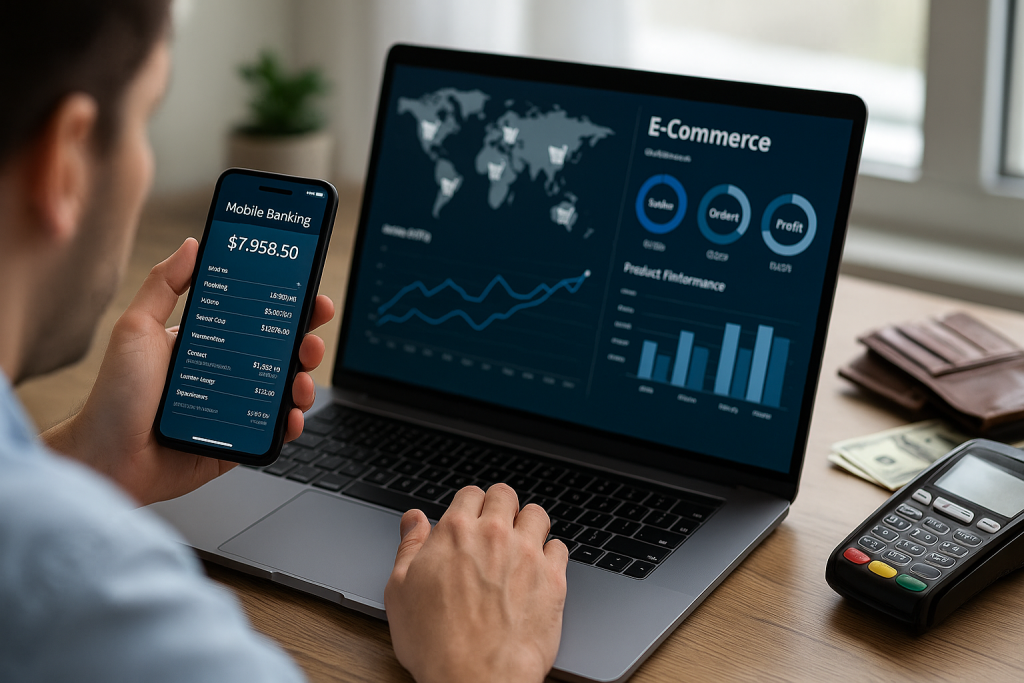The digital economy is fundamentally transforming how personal finance and commerce operate in the US. As technology advances, integrating digital solutions into daily life has become unavoidable, altering consumer behaviors and business models alike. We see this evolution impacting everything from financial literacy and online banking to e-commerce platforms offering a seamless shopping experience.
The proliferation of the digital economy has resulted in a new landscape where traditional financial practices are being digitized. Mobile banking, online budget management tools, and cryptocurrency are becoming more mainstream. Consequently, consumers now have unprecedented access to financial services and information at their fingertips.
The growing impact of the digital economy on finance

The digital economy is fostering a paradigm shift in personal finance management by offering innovative tools and resources. With mobile apps and online platforms, American consumers are empowered to take control of their financial lives more effectively than ever before. These digital tools offer features such as automated budgeting, spending analyses, and investment advice, enabling smarter financial decision-making at the individual level.
Moreover, financial literacy is being democratized as educational resources become more accessible through digital platforms. Individuals can now learn about complex financial concepts, explore investment opportunities, and manage their credit through online courses and tutorials. This access not only encourages better financial habits but also promotes economic inclusivity, reducing barriers traditionally faced by marginalized communities.
How digital platforms are revolutionizing personal finance
Online banking and digital payment systems have redefined how everyday transactions are conducted. Consumers benefit from faster, more secure methods of making payments, transferring money, and managing accounts, all accessible via mobile devices. This convenience drives significant transformation in consumer expectations, prompting financial institutions to innovate continuously or risk obsolescence in the digital economy.
Additionally, these platforms facilitate easier access to broader financial options, such as peer-to-peer lending, micro-investing, and robo-advisors. They provide personalized and automated financial advice, previously only available to wealthier individuals through traditional financial advisors. Thus, the digital economy levels the playing field, democratizing access to financial growth opportunities.
Shaping the commerce landscape through digital innovations
Digital commerce is another crucial element reshaping the American economy. Online shopping platforms, driven by the digital economy, have changed consumer purchasing patterns, emphasizing convenience, speed, and personalized experiences. E-commerce giants are continually enhancing their digital interfaces to offer competitive pricing, faster delivery, and tailored product recommendations, attracting an increasingly tech-savvy demographic.
Furthermore, small businesses and entrepreneurs benefit from these digital advancements, gaining global reach through online marketplaces. Digital marketing and social media enable them to build brand awareness and engage with customers effectively, creating new opportunities for growth and innovation.
Practical applications of digital commerce trends
The rise of digital wallet technologies, integrated with e-commerce platforms, exemplifies how the digital economy is revolutionizing payment processes. Services like Apple Pay and Google Wallet offer consumers a seamless checkout experience, enhancing security and convenience while fostering customer loyalty. As cashless transactions gain popularity, businesses must adapt to these technologies to meet evolving consumer demands.
In addition, subscription-based business models are gaining traction through digital platforms, offering consumers personalized service packages. This shift allows companies to cultivate longer-term customer relationships and predict revenue streams more reliably. By adopting these digital commerce strategies, businesses can thrive in an increasingly digital marketplace.
Embracing the evolution brought by the digital economy
The profound changes introduced by the digital economy necessitate a proactive approach from individuals and businesses alike. Embracing digital tools for personal finance management and adopting innovative commerce strategies are essential for sustaining growth and competitiveness. As the digital economy continues to advance, keeping pace with technological advancements becomes crucial to leverage emerging opportunities.
In conclusion, the digital economy is redefining norms in personal finance and commerce across the US. By equipping themselves with digital literacy and agile strategies, individuals and businesses can navigate this new landscape successfully.
